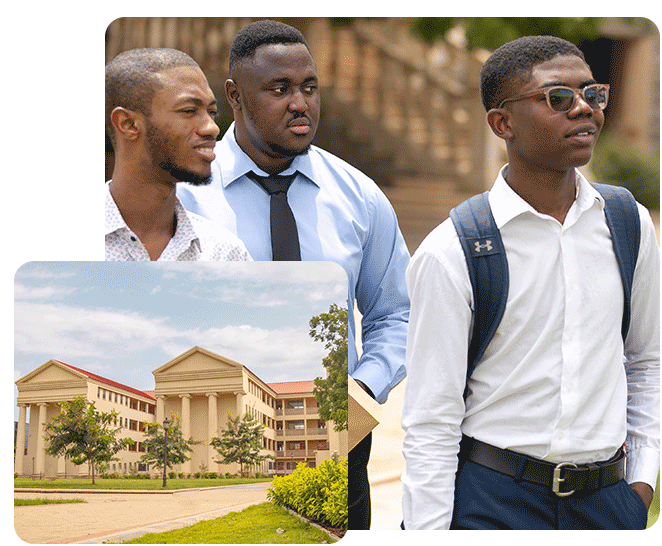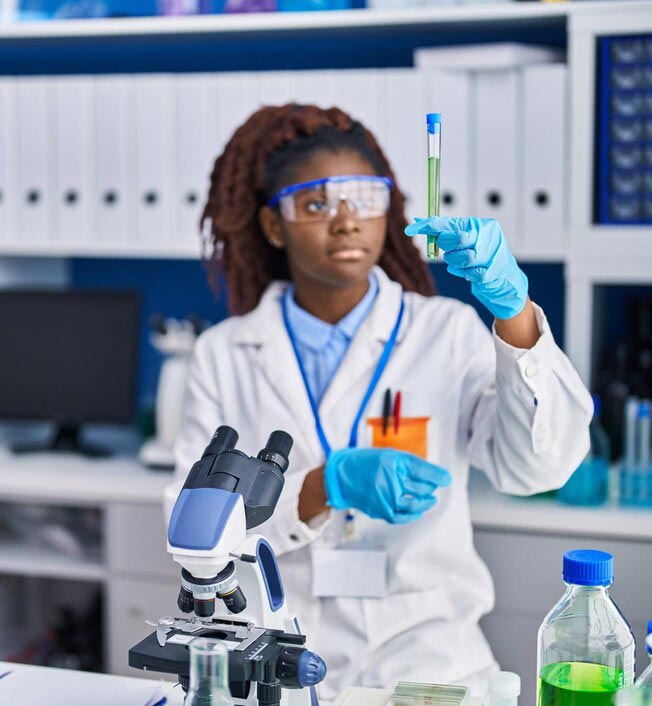BSc Biomedical Engineering
March 5, 2025 2026-01-05 13:37Bachelor of Science in Biomedical Engineering
Advancing Healthcare with Technology
Given the current global health crisis, it has become more incumbent to marry health science and engineering to expedite the solution-finding process of health-related issues.
The world is now experiencing the innovation of cutting-edge technologies to tackle the challenges faced in the health sector from the wheelchair that aids movement to the pain relievers that rests on our tables. The world is redefining quality human health with the birth of biomedical engineers who harness their creative skills and knowledge to reshape the areas of biology and medicine.
BSc Biomedical Engineering at ACity
Students of Academic City’s cutting-edge BSc Biomedical Engineering program are driving the future of medical innovation across the continent. Through a strong focus on design, analysis and modeling, programming, AI integration, biomedical data, and informatics, they develop advanced medical systems, devices, and technologies that enhance and transform healthcare delivery.
This creatively designed, 70% practical program combines the power of Artificial Intelligence, Biomedical Science, and Robotics to prepare students for exciting careers in medical device development, biomedical data informatics, tissue engineering, rehabilitation medicine, and the design of advanced prosthetics—particularly for emerging markets in Africa and beyond.
Top Careers In Biomedical Engineering
In just four years, you’ll gain the skills to innovate, heal, and save lives through technology and science.
Become a:
- Biosignal & Medical Image Processing Specialist
- Product Development Engineer
- Biomechanics Specialist
- Medical Technologist / Biosafety Manager
- Tissue & Organ Engineer
- Biomedical Researcher
Entry Requirements
Minimum C6 in 6 subjects including 3 core subjects (English, Mathematics, Integrated/General Science) and 3 elective subjects. (Physics, Elective Mathematics + Chemistry OR any other elective relevant to the chosen Program)
Minimum D or a pass in 6 subjects including 3 core subjects (English, Mathematics, Integrated/General Science) and 3 elective subjects. (Physics, Elective Mathematics + Chemistry OR any other elective relevant to the chosen Program)
Minimum of 5 credit passes in the IGCSE/O-Levels (Mathematics and English mandatory) and 3 passes in the A-Levels. (Elective/Add/Further Mathematics and Physics mandatory).
Minimum of 5 credit passes in the IGCSE/O-Levels (Mathematics and English mandatory) and a minimum score of 4 points in 3 Higher Level (HL) subjects. (Elective/Add/Further Mathematics and Physics mandatory)
Minimum of 50% overall average pass. (subject to approval NAB) Mathematics, English and Physics mandatory
Minimum GPA of 3.0 (Mathematics, English and Physics mandatory)

Course Outline
- Communication Skills
- French Language
- Fundamentals of Innovation and Entrepreneurship (FIE) Seminar I
- Introduction to Programming with Python
- Technology and Society
- Physics I: Mechanics
- Pre-Calculus (with MATLAB)
- Introduction to Biomedical Engineering
- Fundamentals of Innovation and Entrepreneurship (FIE) Seminar II
- Logic and Critical Thinking
- Text and Meaning
- Introduction to Multidisciplinary Design
- Programming in C
- Physics II: Electromagnetic Field Theory
- Principles of Chemistry I
- Analytic Geometry and Calculus I (with MATLAB)
- Introduction to Electrical and Electronics Engineering
- Fundamentals of Innovation and Entrepreneurship (FIE) I
- Leadership Seminar I
- Physics III: Optics
- Principles of Chemistry II
- Analytic Geometry and Calculus II (with MATLAB)
- Circuit Theory
- Computer Aided Design and Manufacturing (CAD and CAM)
- Engineering Thermodynamics
- African Studies
- Fundamentals of Innovation and Entrepreneurship (FIE) II
- Applied Linear Algebra (with MATLAB)
- Probability, Statistics and Reliability (with MATLAB)
- Analogue and Digital Electronics
- Human Anatomy and Physiology
- Introduction to Artificial Intelligence and Robotics
- Introduction to Organic Chemistry
- Leadership Seminar II
- System Dynamics
- Differential Equations (with MATLAB)
- Numerical Methods (with MATLAB)
- Biochemistry
- Cell and Molecular Biology
- Sensor and Bioinstrumentation I
- Signals and Systems
- Project Management, Engineering Economics and Risk Analysis
- Biomaterials
- Biomedical Imaging and Sensing
- Digital Signal Processing
- Industry Internship
- Research Methodology
- Sensor and Bioinstrumentation II
- Biomechanics
- Biomedical Data Analysis with AI
- Medical Devices and Technologies
- Project Phase I
- Quantitative Physiology
- Rehabilitation Engineering
- Environmental Science and Engineering
- Professional Ethics and Values
- Advances in Imaging Technologies: Neuroimaging
- Medical Image Processing
- Project Phase II
- Real-Time Digital Signal Processing
Why ACity
- Home to students from over 23 countries across africa
- Houses a digital makerspace and a technology & Entrepreneurial center for creative freedom & innovation
- A fully digitized campus with the fattest internet speed in a ghanaian university
- Experienced Faculty with industry experience. Student-to-faculty ratio 5:1
- 70% practical lessons
- Every ACitizen has the opportunity to do a work placement every vacation



